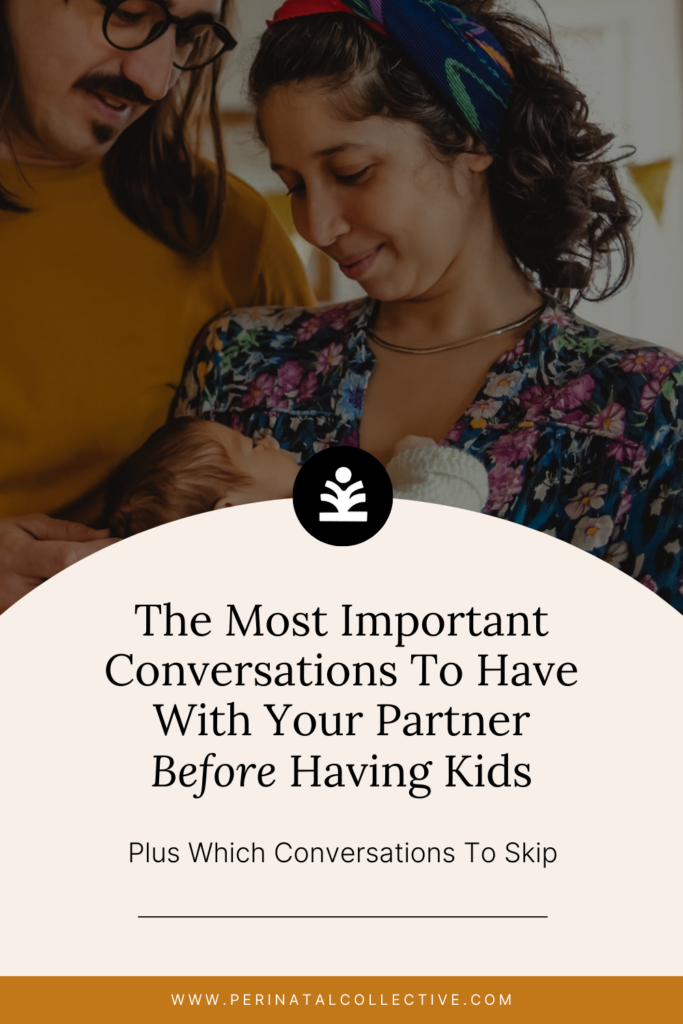Conversations you should be having.
Welcome to “almost parenthood.” Pregnancy is that in-between stage when you’re about to become a parent but you’ve already made shifts from your life without kids. This can feel like a period of waiting, planning, guessing and preparation.
It’s exciting and yet, amidst the excitement of strollers, nursery decor, and baby names, lies a crucial yet often overlooked aspect: the essential conversations to have with your partner before the baby arrives.
While discussions about baby gear and nursery themes can feel important, they merely scratch the surface of what it truly means to prepare for the arrival of a little one.

In the weeks leading up to your due date, it’s easy to get caught up in the tangible preparations, neglecting the intangible but equally vital discussions about mental health, parenting styles, and relationship dynamics.
As you embark on this transformative journey, it’s imperative to carve out time for thoughtful dialogue with your partner. From navigating sleep deprivation, chore splitting, to setting boundaries with extended family, these conversations lay the groundwork for a resilient and harmonious transition into parenthood. Talking about the actual important topics will set you up for a smoother time postpartum.
Instead of getting roped into thinking about the size of fruit your baby is each week, and what colour the baby room should be (as if they’ll even sleep there…) pull your focus to what matters most. As therapists for parents, we hear all the “I wish I learned more about _______” stories, and so we want to help you feel prepared! Here, a look at 17 necessary partner discussions to have before the baby arrives.
What you think you need to discuss:
To be clear, it’s not a bad thing if you had many conversations revolving around these things. Nor is it frowned upon if any of these things are really important to you. The point is, if you only had talks about the following list and nothing else, you’re likely to find yourself overwhelmed and unprepared. These just scratch the surface and many (but not all!) of these topics are surface-level discussions when you consider the full picture of how to adequately prepare for a baby.
- Stroller options
- Car seats
- Maternity and newborn photos
- Favourite baby names
- Birth plan
- Nursery decor
- Budget for nursery
- Baby clothes
What you actually need to discuss:
The below points get at the important things: mental health, parental well-being, parenting styles, your relationship, necessary check-ins, and values.
They can be used as journal prompts to get clear on what you want and how you see this all unfolding and, eventually, they are important conversations you and your partner would benefit from having before the birth of your baby.
Get the difficult conversations out of the way before you’re sleep deprived, tending to a crying infant, and adjusting to a major life change.
These are the conversations where you’ll come up with a realistic game plan and set expectations. No assuming you’re on the same page; have an actual discussion and make sure of it!
Here’s what you want to cover:
- How to know if our mental health is suffering, recognize symptoms in each other, and approach that conversation if it comes up.
- A detailed conversation of how parenting duties will be shared and broken down.
- The role of grandparents, extended family, and friends and how we’ll set boundaries.
- How we’ll cope with night feedings and sleep deprivation.
- How to support me when I’m feeling “touched out” from caring for a baby and need my physical space.
- Our budget for mental health and postpartum support services like therapists, doulas, nannies, lactation consultants, etc.
- Our stances on hot-button topics like co-sleeping, sleep training, and “crying it out.”
- How to support me if breastfeeding is challenging.
- How to support my postpartum body with body positivity and/or body neutrality.
- What words of affirmation I might need to hear when I’m struggling.
- How to stay connected if our sex drives change.
- How to support me when my perfectionism and high expectations aren’t serving me.
- How to support my postpartum physical rehab and nutrition needs.
- Our values as a family and which societal pressures do not serve us.
- Styles of parenting we want to adopt and which ones we will aim to avoid.
- How to fight respectfully and fairly when disagreements and low moods inevitably pop up.
- How to make all of this an ongoing conversation because things may shift.
While certain baby preparations may be enjoyable, true preparedness for parenthood lies in the depth of conversations about mental health, parenting dynamics, and relationship support. By prioritizing these discussions, you’ll not only navigate the early days with more ease but also cultivate a foundation of understanding and resilience for the journey ahead.
This is something that is necessary for the postpartum weeks and period of adjustment, but it also sets the tone for how you approach similar transitions in the future. Like, another child, a career change, a move, etc. It’s easier to address challenges and come up with a realistic well thought-out plan before the change occurs rather than course correcting later.
+ show Comments
- Hide Comments
add a comment